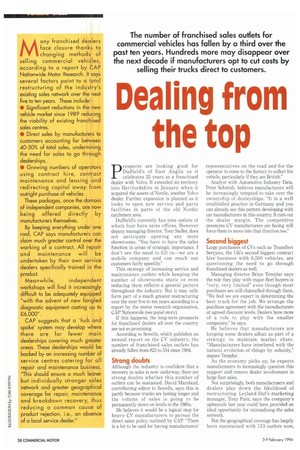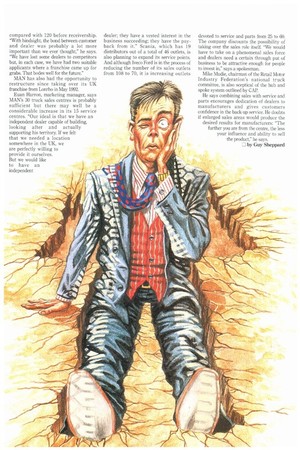The number of franchised sales outlets for commercial vehicles has
Page 40

Page 41

If you've noticed an error in this article please click here to report it so we can fix it.
fallen by a third over the past ten years. Hundreds more may disappear over the next decade if manufacturers opt to cut costs by selling their trucks direct to customers.
Dealing from the top
prospects are looking good for Duffield's of East Anglia as it celebrates 25 years as a franchised dealer with Volvo. It extended its territory into Hertfordshire in January when it acquired the assets of Nordic, another Volvo dealer. Further expansion is planned as it looks to open new service and parts facilities in parts of the old Nordic catchment area.
Duffield's currently has nine outlets of which four have sales offices. However deputy managing director, Tony Sadler, does not anticipate opening any more showrooms. "You have to have the sales function in areas of strategic importance. I don't see the need to fill in—we are a mobile company and can reach our customers fairly speedily."
This strategy of increasing service and maintenance outlets while keeping the number of showrooms static or even reducing them reflects a general pattern throughout the industry. But it may only form part of a much greater restructuring over the next five to ten years according to a report by the motor research organisation, CAP Nationwide (see panel story).
If this happens, the long-term prospects for franchised dealers all over the country are not so promising.
According to Sewells, which publishes an annual report on the CV industry, the number of franchised sales outlets has already fallen from 823 to 554 since 1984.
Strong doubts
Although the industry is confident that a recovery in sales is now underway, there are strong doubts whether this number of outlets can be sustained. David Marslanci, contributing editor to Sewells, says this is partly because trucks are lasting longer and the volume of sales is going to be permanently down on levels in the 1980s, He believes it would be a logical step for heavy CV manufacturers to pursue the direct sales policy outlined by CAP. "There is a lot to be said for having manufacturers' representatives on the road and for the operator to come to the factory to collect his vehicle, particularly if they are British."
Analyst with Automotive Industry Data, Peter Schmidt. believes manufacturers will be increasingly tempted to take over the ownership of dealerships. "It is a well established practice in Germany and you can already see this pattern developing with car manufacturers in this country. It cuts out the dealer margin. The competitive pressures CV manufacturers are facing will force them to move into that direction too."
Second biggest
Large purchasers of CVs such as Transfleet Senyices, the UK's second biggest contract hire business with 6,500 vehicles, are questioning the need to go through franchised dealers as well.
Managing director Brian Templar says the role they play with major fleet buyers is "very, very limited" even though most purchases are still channelled through them. "We feel we are expert in determining the best truck for the job. We arrange the purchase agreement with the manufacturers at agreed discount levels. Dealers have more of a role to play with the smaller companies," he says.
He believes that manufacturers are keeping some dealers afloat as part of a strategy to maintain market share. "Manufacturers have interfered with the natural evolution of things by subsidy," argues Templar.
As the economy picks up, he expects manufacturers to increasingly question this support and remove dealer involvement in large fleet sales.
Not surprisingly, both manufacturers and dealers play down the likelihood of restructuring. Leyland Daf's marketing manager, Tony Pain, says the company's upheavals last year could have provided an ideal opportunity for rationalising the sales network.
But the geographical coverage has largely been maintained with 113 outlets now, compared with 120 before receivership. "With hindsight, the bond between customer and dealer was probably a lot more important than we ever thought," he says. "We have lost some dealers to competitors but, in each case, we have had two suitable applicants where a franchise came up for grabs. That bodes well for the future."
MAN has also had the opportunity to restructure since taking over its UK franchise from Lonrho in May 1992.
Euan Harron, marketing manager, says MAN's 30 truck sales centres is probably sufficient but there may well be a considerable increase in its 15 service centres. "Our ideal is that we have an independent dealer capable of building, looking after and actually supporting his territory. If we felt that we needed a location somewhere in the UK, we are perfectly willing to provide it ourselves.
But we would like to have an independent
dealer; they have a vested interest in the business succeeding; they have the payback from it." Scania, which has 19 distributors out of a total of 46 outlets, is also planning to expand its service points. And although Iveco Ford is in the process of reducing the number of its sales outlets from 108 to 70, it is increasing outlets
devoted to service and parts from 25 to 60. The company discounts the possibility of taking over the sales role itself. "We would have to take on a phenomenal sales force and dealers need a certain through put of business to be attractive enough for people to invest in," says a spokesman.
Mike Mudie, chairman of the Retail Motor Industry Federation's national truck committee, is also sceptical of the hub and spoke system outlined by CAP.
He says combining sales with service and parts encourages dedication of dealers to manufacturers and gives customers confidence in the back-up service. He doubts if enlarged sales areas would produce the desired results for manufacturers: "The further you are from the centre, the less your influence and ability to sell the product," he says.
by Guy Sheppard




















































































